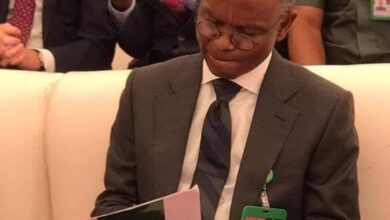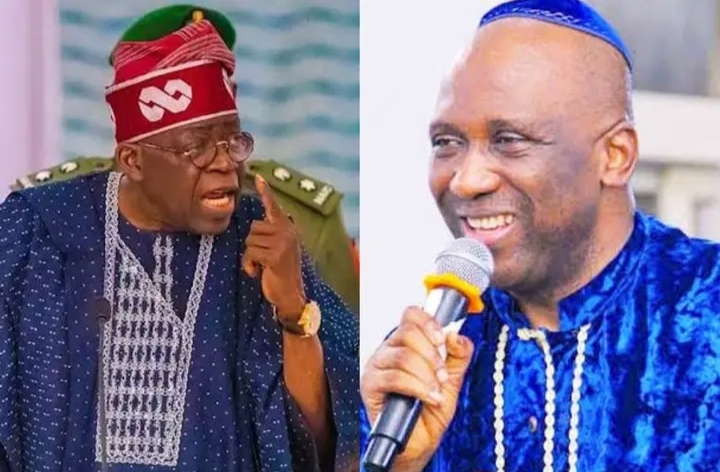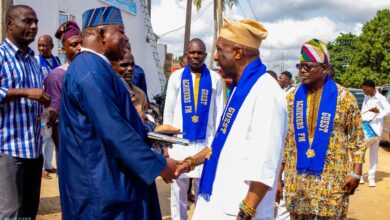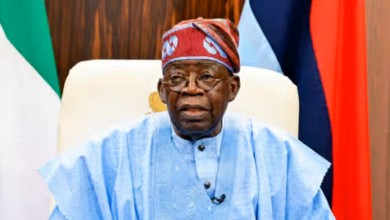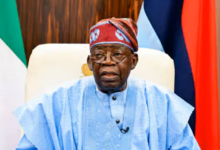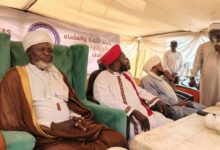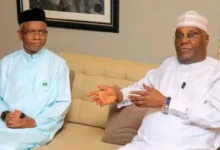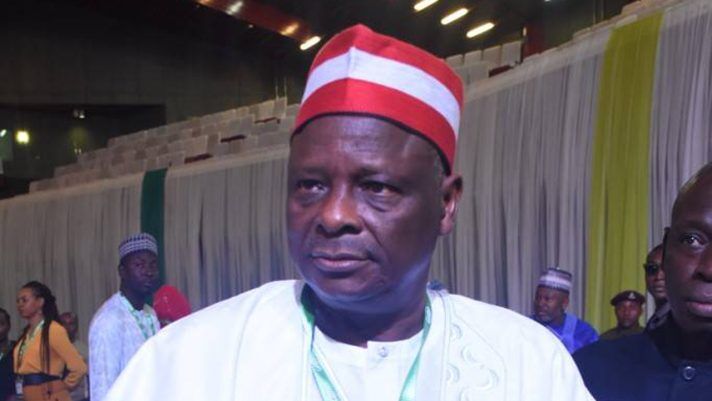SPEAKERSHIP CRISIS: Any attempt to remove, bully Meranda to resign for Obasa will be considered unfair, deliberate marganisation of Lagos State indigenes – Gen Olanrewaju
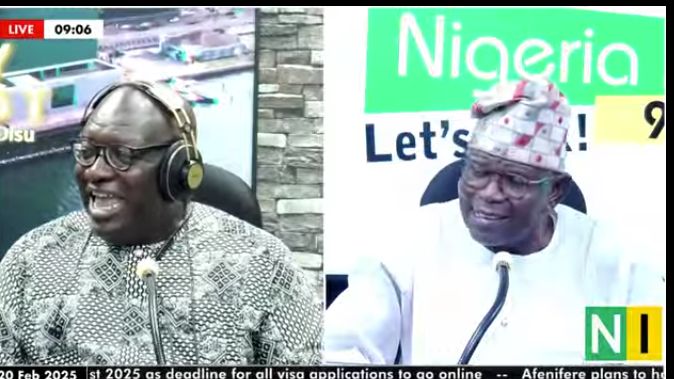
Former Nigerian Minister of Communications and Deputy Defence Adviser in Moscow, Russia, Major General Tajudeen Oanrewaju (Rtd), was on the Nigeria Info 99.3 FM radio on Thursday February 20, 2025 where, hosted by Jimi Disu, he was requested by management of the radio Ikoyi, Lagos-based radio station to give his thought on the ongoing crisis at the Lagos State House of Assembly. Also the Alternate Chairman Chairman Board of Trustees of De Renaissance Patriots Foundation, a socio-cultural organisation for Lagos State indigenes, General Olanrewaju said any attempt to force or impress on Princess Mobolaji Lasbat Meranda to resign or step down for ousted Mudashiru Ajaiyi Obasa as Speaker of Lagos State House of Assembly will considered, not only unfair but also as deliberate policy to marginalize Lagos State indigene. The former Commander Corps of Artillery and General Officer Commanding (GOC) 3 Division Nigerian Army left the Nigerian residents of Lagos State with detailed information with which, through the phone-in session following the interview, they freely expressed their satisfaction with the General they described as man of integrity and confidently voiced their readiness to give their votes to Lagos State indigenes wherever they are presented as candidates in the 2027 elections in the state. Excerpts:
What has brought you really is the crisis that we have on our hands and that is the crisis of the removal of the former Speaker and the emergence of the new Speaker. It is significant in the sense that part of the complaints that have been for a long time, apart from Fashola, is that we don’t have a bonafide Lagosian and the interest of Lagosians is believed to be paramount. I like you to react, first of all, to the removal of the former Speaker and, as an elder statesman in the state and as an indigene, give us your thought on it?
Thank you very much. I have always been so much interested about what is really going out in our state, Lagos State. First and foremost, let me just explain one or two things about myself. I got into the Army immediately Lagos was created in 1967. We were the first set of Lagos State indigenes that were recruited into the Nigerian Army through the NDA (Nigeria Defence Academy) and we went to the war through the period.
Let me just say this that after the crisis in 1966 and it was becoming too clear that there was going to be the issue of keeping Nigeria one and everybody had been prepared to be ready to make his contribution, I think the Animashaun Family made contract with my grandfather, may parents said Oh, why not? We should also make our own contributions. I went to the NDA with Funsho’s (Williams) elder brother, (Major General Rotimi) Williams. We were course mates Alilu Akilu and the rest of them and then we went to NDA, we fought the Civil War and came out.
So, the spirit of Lagos State has always been with me apart from my parents on both sides being indigenes of Lagos State, I am talking about the Animashaun, the Asumo Family that is where we all come from, I am a fifth generation of that old man, our progenitor and when you talk about the Disu side of it in Isale Eko there, we are also there. We are well known in Isale Eko there.
So the issue of Lagos is so paramount in my mind that by the time we came to the Fourth Republic, I felt that I should keep my eyes open about what was going on there.
To the Speaker
Having read biographies of leaders, whether senior, junior or whatever, by my own training I saw that we had the old Speaker coming and I wanted to know his background and I read his background on the Opera social media and you would be surprised I was not impressed, that is where I am going. I was not impressed by his background. I read his profile and I was so much disappointed that we shouldn’t have somebody like this as our Speaker.
Why would you say that sir?
Because I read his background and I realized I didn’t understand the school where he went in Lagos.
That is was not existent or what?
It was a school in Ebute Metta or somewhere. You know all those unapproved schools that we normally had in those days.
But sir, may I come in sir, what was unapproved in your time could well be… When I went to school in those days, there were some schools at that time that were unapproved.
(Cuts in) Not Ahmadiyya College anyway (laughs).
No, not Ahmadiyya College. We could skip that because we don’t know whether it was…..?
(Cuts in) It was leading to something. I read about that and I was so shocked what I read about him and we said, “Okay, let us give him a chance.”
Did you think that he wasn’t qualified?
Yes, I thought he was not qualified to be there.
Is it by his education background or what?
Yes, by his educational background, by his attitude, by his personality and everything. You know, I am trained to understand the personality of people by the nature of my work and I was not disappointed. I told you I’m so much interested in reading people’s biographies. I read that and I just wanted to follow up as a case study.
Is it also that your not wanting him to be Speaker is because about his being indigene or not indigene?
I knew from the beginning that he was not indigene of Lagos State but since we are all practicing democracy, I just felt maybe that is the way they play their own type of politics.
So you are not insisting that a Speaker should be an indigene of Lagos State?
No, I insisted because it was not a reflective government. It has always been the nature of our government. It was not a very reflective government. If you watch it, I have played my own part as an indigene of Lagos State in the selection of our leaders in Lagos State.
But they say that democracy is a situation of numbers. Are the indigenes in the majority?
Well, that is debatable because there is no empirical data where it has been proven that the non-indigenes are more. I can come down to that level with you right now that, if you look at the spread of the indigenes in Lagos State right now, the Aworis that form the core of Lagos State, they occupy nothing less than 14 to 15 Local Governments of Lagos State. That is number one.
You have the Epe Ijebus and the Eko Epe and then you have also the Ikorodus, the Ibeju-Lekkis, you have the Badagry. In Badagry there you have three sub-ethnic groups: You have the Eguns, you have the Aworis, and then you have the Yorubas.
So, you think, because of what you thought was his educational background and other issues, you would rather have somebody else as Speaker?
Well, we felt that we could manage him. We managed him as a Speaker from 2015. You didn’t allow me to land then. He did the first term, I watched that but we realized that there was no Bill that was beneficial that was passed for the Lagos indigenes. That is number one. So I was not disappointed. That was why I was telling you why I had to look his background though he went to second term, then I had to come out and we wrote an article, I’m talking about De Renaissance and we said, “No, you cannot come third time. Let us allow an indigene to come in because, of all these important political positions in Lagos State, there was no indigene there, particularly the first three appointments.
(Cuts in) That is election though.
Yes, through elections, the Governor, the Deputy and the Speaker, none of these three is an indigene.
Who are we going to really blame for that situation given that election is that of numbers and submitting yourself, at least in principle, to the will of the people?
Yes, you are right. Lagos, in terms of geographical spread, people, culture and everywhere, they have not changed but, progressively, what has been changing is just that the population has been increasing. And the nature of governance in Lagos State has been a reflective one, people taking into account that you cannot be a minority in your own state. When states were created, because I was part and parcel of governments that created states, we knew why states were created.
States were created in order to ensure that the issue of marginalization reduced to the barest minimum and that they allow people to enjoy the benefits of state creation, particularly those who had suffered before.
Perhaps this is a point we need to define who an indigene is?
Oh, it’s very simple.
Who do you consider an indigene?
An indigene is a person who can trace is lineage to three, four and five heritage. I will give you a clear example; I can trace my own from Asumo to Abdullahi and from Abdullahi to Muritala Animashaun that you all know up to the AbdulYakini who was my father and from my father to myself and we are talking about the year from 1800 to 1946 when (Herbert) Macaulay died. It was when Macaulay died that I was born. I could trace my own lineage to five generations.
Besides that, my grandfather was born before 1900. As at that time there was a census conducted by the colonial powers so those who were indigenes were there. They were already captured.
Now he is challenging his removal in court. I can’t make a categorical statement because it’s pending in court but, at least, in the seat now is the new Speaker. Have you checked her own background?
Yes, I did.
Are you happy with her own background?
Yeah, very much happy and we are giving full support to her because our platform, which is De Renaissance, is a platform that is designed to support the progress of indigenes in Lagos State having realized the level of marginalization that the people have faced.
But on that platform, sir, do you have members who are in full participation in politics because, part of the problem has been that a lot of indigenes hide away from politics and left the backdoor open?
We decided that we might not be able to achieve our aim of trying to give support to the indigenes of Lagos State to achieve their political rights, to bring about unity among them, to see that they are indivisible, then we want to make sure that there is justice to them, we want to make sure there is justice to them, we want to make sure there is fairness to them. So, the reason why we did that, any time we see any sign that is antithesis to what we stand for, we stand out. We don’t care where, who….
(Cuts in) So, in this current situation you are going to back the newly appointed Speaker hill?
We are backing our sister, our lady to the hill. She is an indigene to the core, both from the mother and from the father and from the root.
She is a princess, anyway, that says it all (laughs). But what justice is hypothetical, sir, because in politics 24 hours is a lot of time? What if there is any attempt to, in political whatever, resolve the issue and she has to step aside again. What would you be doing at that time?
I think it will be very unfair because we have made up our mind as socio-cultural organization what we are fighting for in Lagos State and that is that, we say that come 2027 we are asking that the Governor, the Deputy, the Speaker, Secretary to the Government and the Head of Service must be indigenes of Lagos State.
Do you have the power to achieve that, sir?
That is why I’m saying that the government has to be a reflective government in which you have to understand the purpose of create that state. The purpose of creating that state is to make sure that you reduce marginalization to the barest minimum.
Let me tell you this thing, if the time is available, is that we have noticed that the government is running a one-line policy of marginalization. Even if you are trying to help people who have stayed in Lagos for a long time, we don’t mind. You are bringing people from outside to take over the positions of these people and marginalization started from 2001 with the sacking of about 10,000 people, which was a deliberate policy to deny Lagosians the rights to employment, the rights to their privileges and so on and so forth. Today, when people say they are very poor that they cannot rise beyond certain level, it is as a result of that stupid policy of that time.
Watch the concluding part of the interview by clicking on the Video Link


